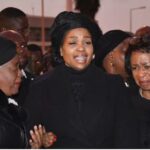As South Africa’s parliament convenes for the first time since the African National Congress (ANC) lost its majority in last month’s elections, negotiations over the formation of a new government are still ongoing.
The ANC has reported a “breakthrough” in establishing a government of national unity, although specifics remain undisclosed at this early stage. Hellen Zille, former leader of the opposition Democratic Alliance (DA) and representative in the talks, conveyed to the BBC that failure to reach an agreement would result in the party not supporting President Cyril Ramaphosa’s re-election.
A pivotal aspect of Friday’s parliamentary agenda is anticipated to be a confidential vote on President Ramaphosa’s continuation in office. This session is being held in a convention center in Cape Town due to damage sustained by the parliament complex in a fire two years ago.
These proceedings mark a historic moment as the ANC no longer commands an outright majority and has yet to form a government. However, Ms. Zille expressed optimism, stating that the two sides are nearing an agreement despite recent minor issues.
The ANC’s loss of its parliamentary majority for the first time in 30 years during the May 29 election, securing only 40% of the vote, necessitated collaboration with other parties for Mr. Ramaphosa’s retention of power.
ANC secretary-general Fikile Mbalula disclosed ongoing discussions with political parties but refrained from elaborating further. He indicated a move toward the political center, as leftist factions within the ANC have opted out of coalition participation.
While parties such as the pro-business DA have agreed to form a government of national unity, the specifics of their cooperation with the ANC remain unresolved. Discrepancies in negotiations persist, with key matters unresolved by the end of Thursday.
The Inkatha Freedom Party (IFP) has confirmed its involvement in a government of national unity, while President Ramaphosa has previously criticized the DA for being “treasonous” and “reactionary.”
Building trust between the long-standing adversaries, the DA and ANC, within a tight timeframe has presented challenges. Any potential deal with the DA would face criticism among some ANC activists due to ideological disparities.
Despite ANC branding the coalition as a Government of National Unity (GNU), it failed to secure participation from the third- and fourth-largest parties, uMkhonto weSizwe (MK) and the Economic Freedom Fighters (EFF).
Both MK and EFF have voiced demands for constitutional amendments to facilitate nationalization, including of land and banks, which the ANC has opposed, further complicating coalition prospects.



